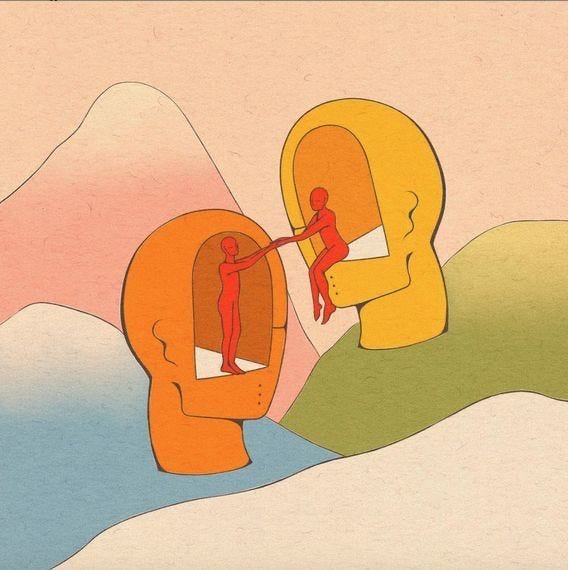Navigating Difficult Psychedelic Experiences

Psychedelics have the power to open doors—some beautiful, others deeply challenging. Whether in therapeutic settings, festivals, or personal exploration, these altered states can bring profound realizations, emotional breakthroughs, and sometimes, unexpected difficulties.
Over the years, I’ve seen both sides of the spectrum—ecstatic experiences of interconnectedness and overwhelming encounters with deep-seated fears. If you’ve ever had a “bad trip” or found yourself facing difficult emotions in an altered state, know this: it’s not just something to endure—it’s something to work with.
In my work as a somatic coach and psychedelic integration guide, I help people navigate these intense experiences, not by suppressing them, but by integrating them into their lives in a way that fosters real growth and healing.
So let’s talk about how to navigate challenging psychedelic experiences, reduce risk, and use these moments as catalysts for transformation.
The Nature of Difficult Psychedelic Experiences
Psychedelics don’t just show us beauty—they also reveal the hidden corners of our psyche.

One moment, you’re in awe of the universe’s vastness. The next, you’re face to face with something painful—old wounds, suppressed emotions, or unresolved trauma.
This is what people often call a “bad trip”, but I prefer to reframe it: it’s not bad, it’s just intense. These experiences arise when the mind is forced to confront something it usually avoids. And that confrontation can be the key to healing.
Stanislav Grof, one of the pioneers in psychedelic research, introduced the concept of psychospiritual crisis—the idea that difficult psychedelic experiences mirror unresolved psychological wounds from our past. What comes up in these moments isn’t random—it’s your psyche bringing something to the surface that needs attention.
From Anxiety to Psychological Crisis: Understanding the Spectrum
Not all difficult trips are the same. They exist on a spectrum:
🟢 Mild Anxiety – Feeling overwhelmed, stuck in repetitive thought loops, or worried about your surroundings.
🟡 Emotional Intensity – Facing painful memories, suppressed emotions, or existential realizations.
🔴 Full Psychological Crisis – Deep dissociation, overwhelming fear, or a sense of ego dissolution that feels too fast, too soon.
Most challenging experiences fall somewhere in the middle, and with the right tools, they can be worked through in the moment. But for more intense crises, having a guide, trip sitter, or integration support afterward is crucial.
The Inner Healer: Trusting the Psyche’s Wisdom
One of the most fascinating aspects of psychedelic experiences is the role of the inner healer—the part of you that instinctively knows how to heal when given the right environment.
Think of your psyche like a self-healing wound. When you cut yourself, the body works to repair the injury. The same happens on an emotional level—psychedelics don’t create new wounds, they reveal the ones that are already there, giving you a chance to tend to them.
That’s why supporting your nervous system through somatic practices is key during and after a journey. Grounding exercises, breathwork, and body awareness can help process what’s arising, rather than getting lost in it.
Creating a Safe Haven: Reducing Risks During a Trip
If you’re exploring psychedelics, especially in a recreational setting, harm reduction is your best tool for safety and well-being.
What helps?
✔️ Having a trip sitter or trusted guide. Someone who can provide reassurance, suggest grounding techniques, and create a safe container for your experience.
✔️ Grounding into the body. Somatic tools—like focusing on breath, movement, or sensation—help anchor you when emotions get overwhelming.
✔️ Setting and environment. The right space, music, and company make a huge difference in how the trip unfolds.
✔️ Knowing your dose. More isn’t always better. Start low, especially if you’re new to psychedelics.
In festival settings, Psycare spaces are a game-changer. These are safe zones where experienced volunteers offer support, reassurance, and even integration conversations after intense experiences. If you’re heading to an event, check if one is available—or bring a trusted trip buddy.
Integration: The True Transformation Happens After the Trip
The real magic of psychedelics isn’t in the trip itself—it’s in what you do with it afterward.
Without integration, even the most profound experience can fade into memory. But when you take time to process and apply what you’ve learned, it becomes a catalyst for lasting change.
Here are some key integration practices:
📝 Journaling – Writing about your experience helps unpack emotions and insights.
🧘 Somatic Practices – Movement, breathwork, and nervous system regulation help release stored tension and integrate emotions at a body level.
🎨 Creative Expression – Art, music, or storytelling can give shape to what words can’t fully express.
🗣 Talking It Through – Whether with a coach, therapist, or integration group, discussing your experience can bring deeper clarity and grounding.
Bringing It All Together: Moving from Discomfort to Growth
Difficult psychedelic experiences can feel overwhelming in the moment, but they hold immense potential for transformation when met with the right tools and support.
⚫ They’re not something to fear, but something to work with.
⚫ The inner healer within you knows what’s surfacing and why.
⚫ Integration is where the real healing happens.
If you’re processing a challenging psychedelic experience or seeking support for deeper integration, I offer 1:1 somatic coaching and psychedelic integration sessions.
Together, we can:
✔️ Unpack what surfaced during your trip
✔️ Use somatic tools to release stored tension and emotions
✔️ Find practical ways to apply your insights to daily life
Psychedelics can open doors, but true transformation happens when we step through them with awareness.
All the light!
Justina